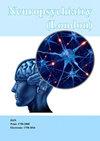Effects of Dielectric Monopolar Radiofrequency with Vacuumtherapy in the Treatment of Chronic Constipation in Patients with Intellectual Developmental Disorders
引用次数: 4
Abstract
Aim Chronic constipation is a high prevalence complication in patients with intellectual developmental disorders due to medication intake and physical activity reduction. Several manual therapy techniques have achieved good results at its treatment, being these a considerable option as no adverse effects have been shown. Nevertheless, the use of electrotherapy devices has not been studied on chronic constipation treatment. These may be considered as a potential tool which may supplement treatment. Thermotherapy by dielectric monopolar radiofrequency (DMR) linked to vacuum therapy could activate local blood irrigation at the colon level and peristaltic movements due to mechanic push-pull. The aim of this study is therefore to prove the efficacy of DMR linked to vacuum therapy for the treatment of chronic constipation in intellectual developmental disorders patients. Methods Nineteen patients which met the inclusion criteria were chosen. Number of stools and shape of them (Bristol Stool Questionnaire) were measured in a period of 14 days, when patients received their common care techniques for chronic constipation. After that, patients received 14 days of DMR linked to vacuum therapy treatment. The same variables were measured in the meantime so as to observe possible differences. Results DMR linked to vacuum therapy proved an improvement in number of stools per day and the shape/quality of them. No adverse results were observed. Conclusion DMR linked to vacuum treatment seems effective for the treatment of chronic constipation in intellectual developmental disorders patients.介质单极射频真空疗法治疗智力发育障碍患者慢性便秘的疗效观察
目的慢性便秘是智力发育障碍患者中由于药物摄入和体力活动减少而导致的高发并发症。几种手工治疗技术在其治疗中取得了良好的效果,由于没有显示出不良反应,因此这些是相当大的选择。然而,使用电疗装置治疗慢性便秘还没有研究。这些可能被认为是一种潜在的工具,可以补充治疗。电介质单极射频(DMR)热疗与真空治疗相结合,可以激活结肠水平的局部血液冲洗和机械推拉的蠕动运动。因此,本研究的目的是证明DMR与真空疗法联合治疗智力发育障碍患者慢性便秘的疗效。方法选择符合纳入标准的患者19例。在14天的时间里,当患者接受慢性便秘的常见护理技术时,测量了大便的数量和形状(布里斯托大便问卷)。之后,患者接受为期14天的DMR真空治疗。同时测量相同的变量,以观察可能的差异。结果DMR与真空疗法相结合,证明了每天排便次数和排便形状/质量的改善。未观察到不良结果。结论DMR联合真空治疗可有效治疗智力发育障碍患者的慢性便秘。
本文章由计算机程序翻译,如有差异,请以英文原文为准。
求助全文
约1分钟内获得全文
求助全文
来源期刊

Neuropsychiatry
NEUROSCIENCES-PSYCHIATRY
自引率
0.00%
发文量
0
审稿时长
>12 weeks
期刊介绍:
Neuropsychiatry is a bimonthly, peer reviewed, open access Journal aimed at exploring the latest breakthroughs in brain and behavior in order to enhance our current understanding of the disturbances in brain function. The Journal has established itself among the most authoritative journals in the field by publishing cutting-edge research in neuropsychiatry and also serves as a forum for discussing the latest advancements and problem statements in the field.
 求助内容:
求助内容: 应助结果提醒方式:
应助结果提醒方式:


